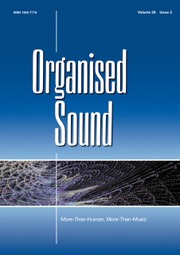On the process and aesthetics of sampling in electronic music production
Published online by Cambridge University Press: 21 April 2004
Abstract
Most scholars writing on the use of samplers express anxiety over the dissolution of boundaries between human-generated and automated musical expression, and focus on the copyright infringement issues surrounding sampling practices without adequately exploring samplists' musical and political goals. Drawing on musical examples from various underground electronic music genres and on interviews with electronic musicians, this essay addresses such questions as: What is a sampler, and how does the sampling process resonate with or diverge from other traditions of instrument-playing? How do electronic musicians use the ‘automated’ mechanisms of digital instruments to achieve nuanced musical expression and cultural commentary? What are some political implications of presenting sampled and processed sounds in a reconfigured compositional environment? By exploring these issues, I hope to counter the over-simplified, uninformed critical claims that sampling is a process of ‘theft’ and ‘automation’, and instead offer insight into the myriad and complex musical and political dimensions of sampling in electronic music production.
- Type
- Research Article
- Information
- Copyright
- © Cambridge University Press 2003
Footnotes
- 63
- Cited by


